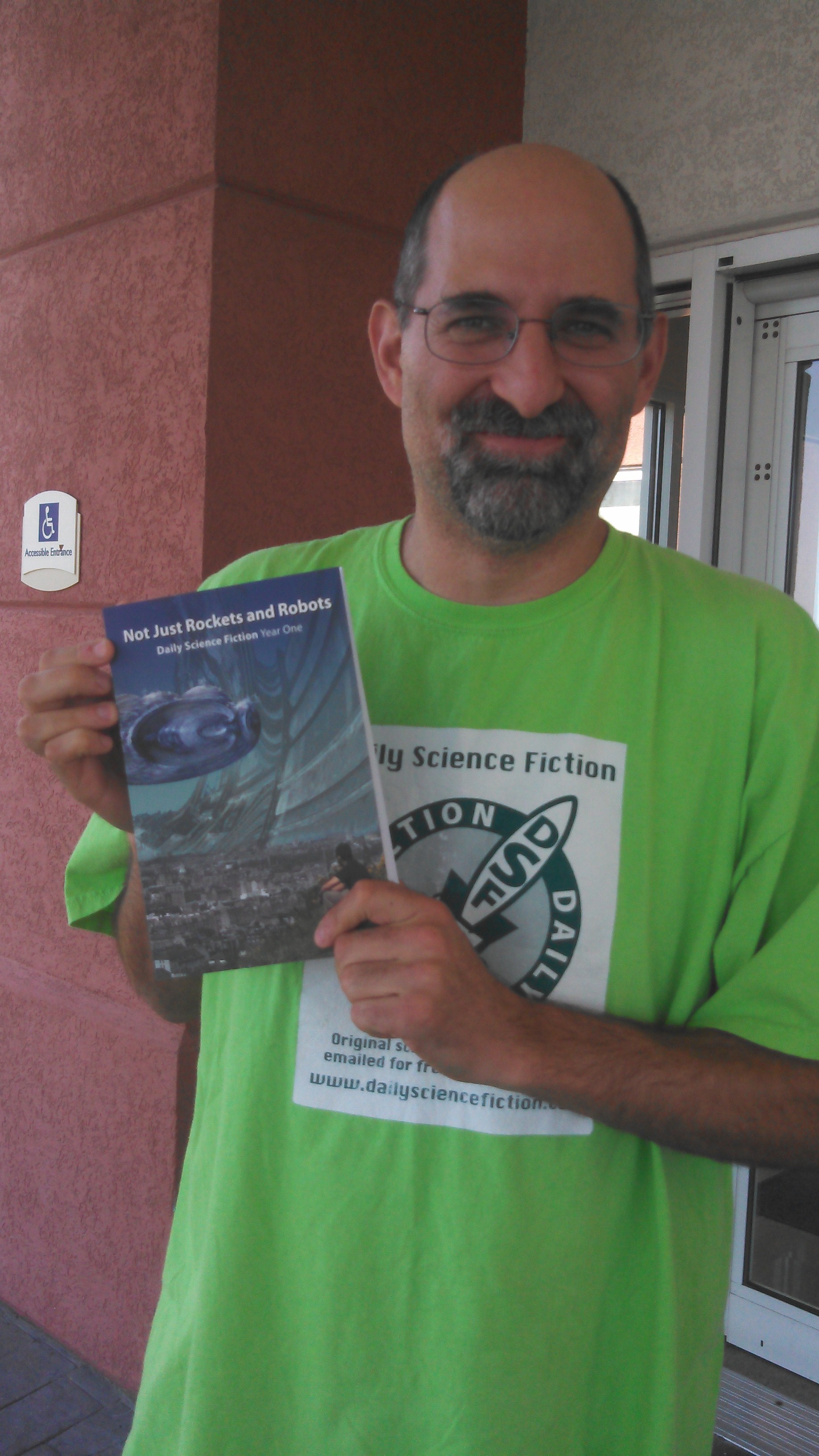written by Frank Dutkiewicz
It has been a while since I posted a review , I’ve been a very busy writer. The editors of Daily SF have been busy as well. They have proudly announced that Year 2 of Not Just Rockets and Robots is about to go into print. If you haven’t had a chance to read Volume 1, by all means, order a copy. You won’t regret the purchase. Now onto this month’s stories†�
On first read, I enjoyed reading “Past Tense” by James Beamon (debut 4/1 and reviewed by Dustin Adams) very much. I let it happen and followed the time line to a catchy conclusion. There’s a kind of all-life-in-an-instant vibe that I particularly enjoy.
However, in trying to frame my review, thus reading the story over, I became confused and started asking questions. I also noticed the distinct lack of space the character(s) inhabit.
My advice: Read this one once. You’ll like it more if you don’t look too deep.
“Parallel Lines” by Russell James (debut 4/2 and reviewed by Dustin Adams).
At first I thought I’d comment on the characters being simply “he” and “she” which, in my opinion, leaves them without much personality. (There’s something about a name, even for fictional characters.) However, as the story progressed, more and more details were revealed, and eventually, I discovered there was a good reason for the vagueness upfront. Next, I was going to comment on the lack of a speculative element early on, but here too the story catches up and then soars with its idea.
“Parallel Lines” refers to parallel Universes, and about the more healthy of the two aged protagonists has found a way to tap into and record the lives of those more happy other he’s and she’s.
Russell James scores a heartwarming story with Parallel Lines. It may start slow, but keep reading, you’ll be glad you did.
I fear that if I provide a review about “Rocket Dragons” by Larry Kincheloe (debut 4/3 and reviewed by Dustin Adams), a story that is about stories, I may create a circular paradox and the entire universe will be destroyed. So I will sum up.
A girl from a dystopian post-dystopan future, living in a time where today’s conveniences and technology have been forgotten by all but the eldest, finds a copy of a DSF book. She enjoys the stories, but can’t resolve what it means to rate a story by Rocket Dragons.
The tongue-in-cheek, inside-joke, breaking the fourth wall combination makes for a sure-fire smile-on-face read.
The Sandman brings dreams to boys and girls using dust in a sack he wears around his waist in “The Sandman’s Dream” by Jess Hyslop (debut 4/4 and reviewed by Dustin Adams). He’s followed one girl, Susan, into adulthood. At some point, she needs to put an end to his visits. Dreams are for the young.
Unfortunately, this story didn’t have the effect on me I believe was intended. I found the Sandman eerie and stalker-like. He’s a child, who wants to play and give dreams, and does to children, such as Susan’s son, but also to her well into her adulthood. She tells him, “I have a husband now, a son.” Which he already knows. So her dreams must end, but he asks if he can still visit the son, to which Susan replies yes. Not exactly solving the problem created in the opening, which is that it’s time for the Sandman to go.
“When The Trumpet Sounds” by Sean Melican (debut 4/5 and reviewed by Dustin Adams)
I’m torn on this one. First, it starts out with a boy having his blood drawn. He’s got a cold, and this is significant. He’s thrown out and won’t be going. If that sounds difficult to follow because of a lack of world info, then you’ll understand why I’m torn. Because once I figured out what’s going on, and saw the details and images of the world, the story started to rock. In time, I learned that we’ (humans) are getting off planet. The giant ship in the sky (ark) is recruiting based on what the main characters can only speculate is logic. An untold number of humanity is standing on the line, some several days away from being examined, and the narrator “works the line” for his livelihood.
This story is more about the journey than the destination. Let it unfold, and trust everything will make sense.
Duty outweighs our most cherish possession in “Leaving Home” by Kurt Pankau (debut 4/8 and reviewed by Frank D). The protagonist is visited by an Eraser-man. This is the second time she has met one but the details of the previous visit are unclear. He has come for her son, Chris, but not to arrest him. He has decided to join the force.
“Leaving Home” is a tale about loss. The mysterious agency the Eraser-man represents enforces disturbances to the timeline. Chris will lose his existence to be a member. His mother will to remember him, a reality she senses as he walks out the door. A good work of flash, heart-wrenching with a sad ending.
Recommended.
An enterprising young woman offers a nostalgic service in “Cleaning Lady” by J. Kyle Turner (debut 4/9 and reviewed by Frank D). The protagonist in this tale is an out of work college graduate who creates a niche in the market , cleaning done by human hands. Her clients prefer the human touch of a cleaner, so she puts on a show while they are watching. Once satisfied, the clients leave her to her work, which is when she brings out the robot.
“Cleaning Lady” is the tale of a clever girl. The cleaning robots are flawless , and that apparently bothers some. The protagonist lets the robot do its work while she flows behind it to give the job the flaws that make a human touch. The story follows a woman who employs the old bait-and-switch tactic and puts it to good use. I give her crooked but brilliant business practice a high five. Nice idea and an original premise. I liked it.
“Snake Sister” by Melissa Mead (debut 4/10 and reviewed by Frank D). The protagonist is the sibling of a cursed girl. The jewels she vomits when she speaks have attracted a prince, but the jewels are not long for this Earth. The protagonist is determined to fix the problem and force the witch to remove the curse. Instead, the witch rewards the protagonist for her sharp tongue.
“Snake Sister” is based on a fairy tale that I am unaware of. The story is told with a vengeful voice. The open ended finale has a dark promise. I found the tale delightfully sinister.
“Daughter of Mettle” by Aaron DaMommio (debut 4/11 and reviewed by Frank D).
The protagonist of this tale is the child of a superhero, angry atthe lack of time he has for her. But she has a plan to force him to make time for her and keep his promises.
This tragic tale is written from the perspective of regret. The story could have been told from an attention neglected child of a celebrated fireman, police officer, or soldier , as a little girl would be envious that others receive her hero’s heroics rather than her.
“Heart of Joy” by Kate O’Connor (debut 4/12 and reviewed by James Hanzelka)
Luscinda, the dancer from Ymir, has stolen the heart of the most powerful man in the galaxy. Feon, the Senior High Chancellor, delights in her public performances and her private attentions. When he is given an automaton that can dance perfectly, however, the relationship cools. Luscinda eventually leaves to go home, but can she leave the emotional attachment behind?
This is a love story. Like so many it deals with the loss of love through indifference or misperception. The author handles the subject well and it gives us a new take on the subject. The metaphor of dance for love is clear. I found the story entertaining, not really something I would seek out, but I enjoyed it nonetheless. Give it a try, particularly if tale of love and loss are your cup of tea.
“Never Leave Me” by Michelle Ann King (debut 4/15 and reviewed by James Hanzelka)
Katrine loves Aron, but hears the stories about him when he delivers his wares to the village. She has visions of him in others’ arms. When she visits the old woman in the forest to put a spell on him to remain true, the old witch refuses. In desperation Katrine kills the old woman and takes her power. Now she can hold on to Aron, but at what cost?
This is a poignant story about love and fear of loss. It was well written and engaging, and there is a strong cautionary ending. The story does tread a well-worn path, so there’s a bit of predictability to the ending. It is still worth the time spent in reading it.
A magician uses the art of misdirection on a very direct man in “Legerdemain” by Gabriel Murray (debut 4/16 and reviewed by Frank D). The protagonist tempts a lustful man. Geoffrey Spencer is a man of free love, and is used to getting what he desires. Geoffrey’s wife introduces him to Claude, a talented illusionist. Geoffrey is interested in Claude’s vanishing trick and in Claude. A good magician will never reveal his trick, but may allow you to experience it.
“Legerdemain” is a tale of deception. The author of it preforms a deception on the reader while his protagonist preforms it on a disloyal misogynist. Not fair, Mr. Murray. At least Geoffrey had a chance to see the illusion coming.
The Chosen One has a destiny to fulfill in “The Chosen One Can’t Lose” by Sean Vivier (debut 4/17 and reviewed by Frank D), and it will be fulfilled, no matter which path is taken.
“The Chosen One” is a parody of the ‘chose your path’ adventure books, where the reader decides the direction the protagonist travels in the tale. In this particular tale, more than one path is offered but all roads lead to the destination. Loved the ending of this funny tale.
“What Merfolk Must Know” by Kat Otis (debut 4/18 and reviewed by James Hanzelka).
She first saw the Deathships when she was ten migrations old; from then on she was filled with curiosity about the humans they carried. But the humans were dangerous. Counseled by her Mamma to avoid the ships and the dangerous humans they carried, she avoided the ships. Until she was twenty migrations old, then she went out to find answers to her questions, but with the help of the Sea Witch finds more.
This is a nice little fable that fits in with any number of other stories. The writer does a pretty good job of blending the old with her own vision. I found myself drawn into the main character’s struggle to follow her own curiosity in spite of the warnings of her mother. This is a good read and worth investing the time in it.
“Paradise Left” by Evan Dicken (debut 4/19 and reviewed by James Hanzelka).
Rob was feeding Whistler when Ashley stormed in from the Rebellion. Five and a half feet of ash covered Rebellion. “How did the war go?” Rob asked. “Great,” Ashley replied. But it wasn’t great, though they’d beaten the machines and been granted the right to govern themselves, it was all a charade. The machines were humoring them, allowing them to live in a faÃ�’ �ade of the world. Rob had left the rebellion because he saw no reason to fight anymore; Ashley could never give it up. The rift was growing, but would it drive Ashley to another world? And if it did, would Rob follow?
This is classic science fiction. The author deftly explores subjects like the relationship between man and machine and that between man and woman. He also pictures a future where the machine’s loving care for humans provides an Idyllic world that smothers individuality. Some can live in it, succumb to the lotus blossoms, others rebel against it. A well crafted story and one I would recommend, particularly those that love old school SF.
A codebreaker turns to an old Cold War veteran for help deciphering small snippets of signals from the stars in “Snippets” by k. b. dalai (debut 4/22 and reviewed by Frank D). A National Security data analyzer is given the task of determining if years of random SETI signals have meaning. The snippets of data are random and few, buried in the back ground noise of the galaxy. He turns to his father-in-law, an old communications expert. The old vet points out what everyone has missed, and leaves the protagonist with disturbing questions that need to be answered.
“Snippets” is a collaboration effort from a married couple. This is a rare work of flash that touches on a present day scientific dilemma and sets it in an outstanding science fiction premise. The story is set up as a mystery , mysterious signals without a meaningful pattern , that leaves small clues for the reader to piece together; very difficult to do but is outstanding when done well. This compelling tale has a finale I found chilling, and left me questioning our place in the universe.
Good flash fiction is rare. Outstanding flash fiction should be celebrated. I can’t remember a work this brief that had me this hooked and left me this satisfied when I read it. Rarely do I feel compelled to reread any work immediately, this one I did twice.
Recommended.
A son’s error in time cannot be undone in “Grief In The Strange Loop” by Rhonda Eikamp (debut 4/23 and reviewed by Frank D). A ten year-old boy is left to watch over his father’s time machine while Pop makes a jump, and makes a mistake that strands his dad centuries in the past. His mother has never forgiven him. Racked with guilt, he spends decades trying to correct his mistake. The entire family discovers time changes people, and that time can produce wounds that weren’t there before.
“Grief” is a story of guilt. The protagonist sandwiched between opposite ends of blame spanning centuries, and an even wider gap of a few decades. The parents of this tale act like spoiled children in this tale. Resentful, bitter, and shallow , the mother and father seem like two people that do not deserve children who moved the very heavens to make them happy.
An envious sister wants to fly in “Swan Song” by Melissa Mead (debut 4/24 and reviewed by Frank D). The protagonist in this dark tale is the sibling of a boy born with wings instead of arms. Her parents and friends mistake her bitter demeanor as concern for her deformed brother, but her brother understands that what she feels is envy.
“Swan Song” is based on a tale I am unfamiliar with. The girl wants to experience flight and forms a plan that will be doomed to failure. It has a very ominous exclamation point for a conclusion.
A man has fallen for the light of his life in “The Lady Electric” by Gary B. Phillips (debut 4/25 and reviewed by Frank D) but society needs that light. A brilliant inventor named Edison can put the energy she secretes to good use. “Lady Electric” is a tale of man who will do anything for the woman he loves. His love has become a prisoner to Edison, but our hero has a plan to rescue her.
“Lady Electric” takes a couple of dark turns. The protagonist’s plan relies on Edison’s vanity. I found the tale murky; details of the woman’s condition, origins, and how she became to be a source of electricity were never explained. The story hints that she is a mystery. I would have preferred a solved mystery or two to go with its conclusion.
A dying and honorable breed is sacrificed for its healing power in “Chasing Unicorns” by Terra LeMay (debut 4/26 and reviewed by Frank D). The protagonist is a desperate man in league with desperate people. They hunt unicorns, using their virginity as bait for the magical beasts. Although they cannot resist the allure of a virgin, the unicorns are not defenseless.
“Chasing Unicorns” is written from the perspective of an addict. The horn of the magical beast can heal anything , even the poison men put in their own bodies. The protagonist is eager to cure his brother, an addict in bad shape. Anticipation for the hunt begins to haunt him in his dreams. Unicorns are becoming rare, and may soon be gone. A conflict of helping blood against destroying a natural treasure wracks the potential killer.
“Chasing Unicorns” is a tale a modern day poacher could tell. Guilt competes with greed. Knowledge that he may be ending a great species tears at the protagonist. Compounding his dilemma is the unicorn’s psychic link with its virgin.
The disclaimer before the tale warns the reader of a dark tale, and dark it is indeed. There are no sympathetic characters to root for , even the unicorn proves to be deceptive. Guilt fills the protagonist from the start and he becomes so saturated with it that the reader absorbs his overflow by the end. If you don’t wish to feel dirty after reading, you may want to steer clear of this tale. If you’re the type that would want to see a poacher feel awful by his deeds, by all means, dive right in.
“Shades Of The Father” by M. Adrian Sellers (debut 4/29 and reviewed by James Hanzelka)
Aubrey is amused by the graffiti scrawled across the Marty-Mart wall as he pulled in front of the building. Inside he can’t help but laugh while paying for the pack of smokes. Martin Paxton notes he is wearing his old man’s sunglasses, the only possession his late father left him. The sadness and confusion about the gift brings Aubrey back down from his temporary high. As he drives back home each building has graffiti on it, almost as if someone had tagged the whole neighborhood overnight. The witty words of wisdom pull him back from his funk and he starts to appreciate his father more than he did in life.
This is a good tale for the month of Father’s Day. It deals with fathers and sons. The story lets us understand how sometimes we don’t appreciate the relationship until it’s too late. I loved the premise and how well the writer let us in on the inside joke, as well as how he made us feel about the relationship of Aubrey and his father. It also reminds us that often the best gifts are the ones we least expect. Take the time to read this story; you won’t be disappointed you did.
“It’s Good to See You” by Douglas Rudoff (debut 4/30 and reviewed by James Hanzelka)
Most on the ship don’t like the Necropolis, but one has to pass through it to get to the viewing port. Brad doesn’t mind because it gives him time to reflect on what he left behind on Earth. Anyway he will be joining the dead soon, taking his eight year shift in darkness. As he stands at the nose of the ship, he thinks ahead to the end of the forty year journey. A message from his ex-wife pulls him back to the past. It’s been fifteen years since they parted and somehow they had ended up on the same ship. Was he strong enough to go back emotionally? It was a question that would also answer his strength to go on.
Set in the future, where mankind is leaving Earth, searching for new worlds to explore, the piece does a good job of showing the burdens we will carry along with us. The author lets us see Brad’s pain, but helps us to understand that in order to move ahead we sometimes have to deal with the past. This one is well worth the read.
To Be Heard, Or Not To Be Heard†�
†�that is my question. Daily Science Fiction is a publication that has earned its stripes. It is a top market, in readers and in pay rate. It is receiving more accolades for its efforts every year (not as many as I believe it should but that is another topic for another time). It is still the only publication that uses the Internet’s email delivery system to distribute its product. I applaud it’s originality for tapping into this outlet, but think it is time that it expands into a new and growing market.
My profession as a traveler has granted me an outsider’s view in the rise in the audio book market. The racks for the CD imprinted publications in traveler stops has become larger than the video (movies and TV serials) DVD/DVR shelves, at many places, and dwarfs the printed paperback carousels and music CDs. Audio books are becoming a hit, yet few authors have cracked into it.
A few wise bestselling names (Stephen Coonts, Danielle Steele, Clive Cussler, Tom Clancy) have gone all in and dominate the shelves. Others , like Stephen King , are testing the waters and are displaying old classics in this market. There are a couple of publishers (Angry Robot) who have elected to showcase new works and authors. The shelves have a mixture of fiction and non-fiction. Most are old bestsellers but a few are new. You’ll find a science fiction tale or two, but there is one type of book I have yet to see; the short story collection.
As someone who drives for hours at a time, I have wondered why no one has tried to market the short story (i.e. anthology or collection format) in an audio market. Quick, a tight frame, and complete , they’re perfect for a person who needs a distraction to help pass the miles but doesn’t require an audience’s complete attention that would divert their mind from the road. Listening to a short story would be also like listening to a single cut on an album. It is a niche that needs filling.
I recommend the editors of DSF consider looking into this market, but if they do, to dip their toes warily into this water. Not Just Rockets and Robots would be a great collection to listen to, but at 425,000 words, would be a logistic nightmare to record , and likely be too expensive to market. Dividing it up into smaller bites would be the ticket. The first three to four months of Daily Science Fiction would be a great place to start. With the right readers, the collection would be affordable and short enough to encourage potential customers to give it a chance. Reliving previous DSF tales would be a whole new experience when it is read by another, hopefully with all the minor inflections that come with storytelling.
So what do you say, Jon and Michele? Care to take a shot at another innovative leap?
 Frank Dutkiewicz writes. Frank Dutkiewicz eats. Frank Dutkiewicz probably excretes, but for some reason Frank Dutkiewicz is reluctant to talk about it. Frank Dutkiewicz puts his pants on one leg at a time, except when he doesn’t. Frank Dutkiewicz flies a spaceship. Unlike Han Solo, Frank Dutkiewicz can make the Kessel Run in only nine parsecs. Frank Dutkiewicz has a cybernetic badger/weasel hybrid as a friend. When Frank Dutkiewicz says “Jump,” frogs say “How high?” If Frank Dutkiewicz jumped as hard as he could one night, the Earth would fall into the sun. Frank Duktiewicz’s last name is hard to spell. Frank Dutkiewicz’s last name is also hard to pronounce. Frank Dutkiewicz says that anyone who says these things about his last name is just jealous. Frank Dutkiewicz did not write his own bio this month.
Frank Dutkiewicz writes. Frank Dutkiewicz eats. Frank Dutkiewicz probably excretes, but for some reason Frank Dutkiewicz is reluctant to talk about it. Frank Dutkiewicz puts his pants on one leg at a time, except when he doesn’t. Frank Dutkiewicz flies a spaceship. Unlike Han Solo, Frank Dutkiewicz can make the Kessel Run in only nine parsecs. Frank Dutkiewicz has a cybernetic badger/weasel hybrid as a friend. When Frank Dutkiewicz says “Jump,” frogs say “How high?” If Frank Dutkiewicz jumped as hard as he could one night, the Earth would fall into the sun. Frank Duktiewicz’s last name is hard to spell. Frank Dutkiewicz’s last name is also hard to pronounce. Frank Dutkiewicz says that anyone who says these things about his last name is just jealous. Frank Dutkiewicz did not write his own bio this month.









